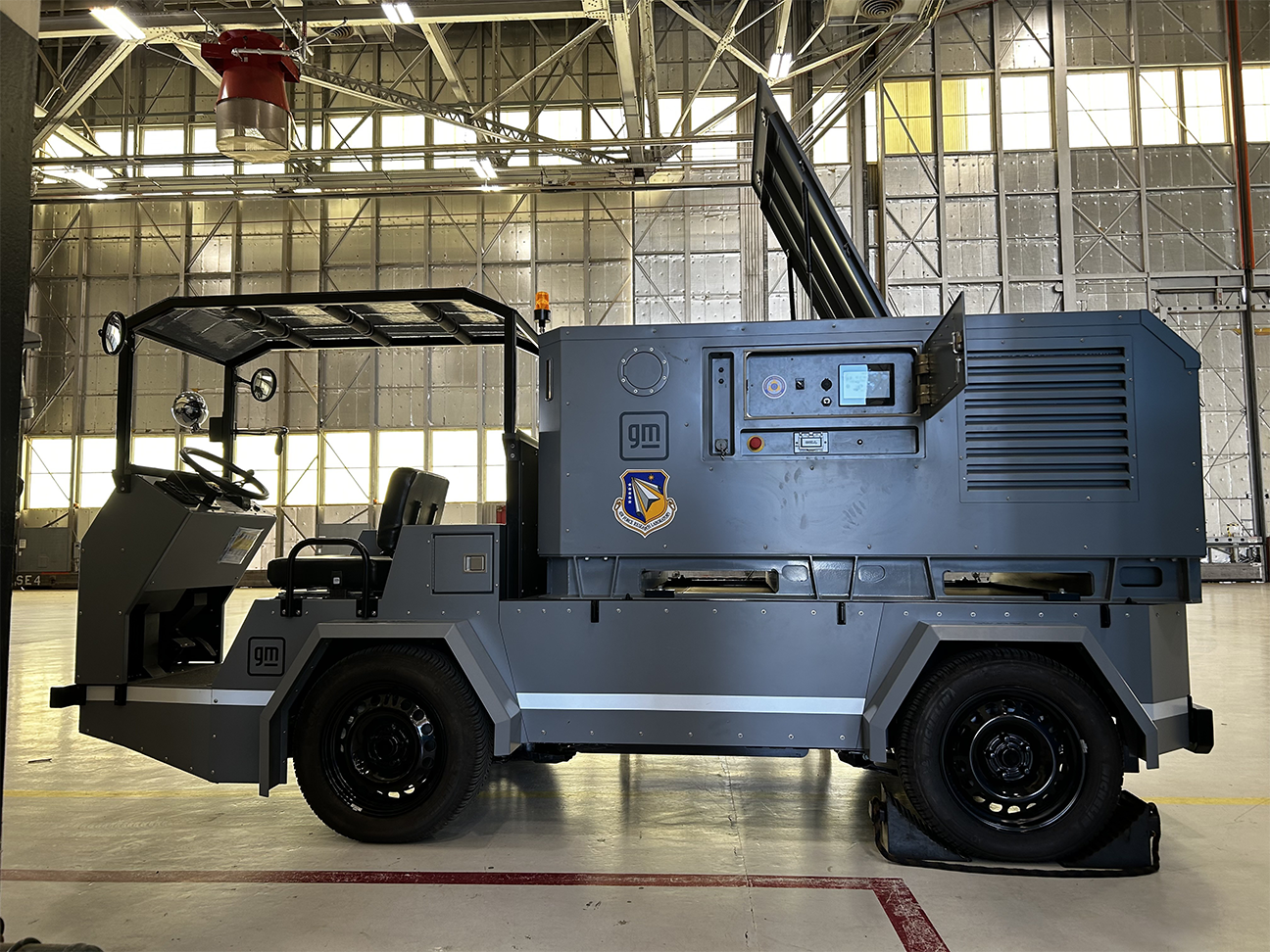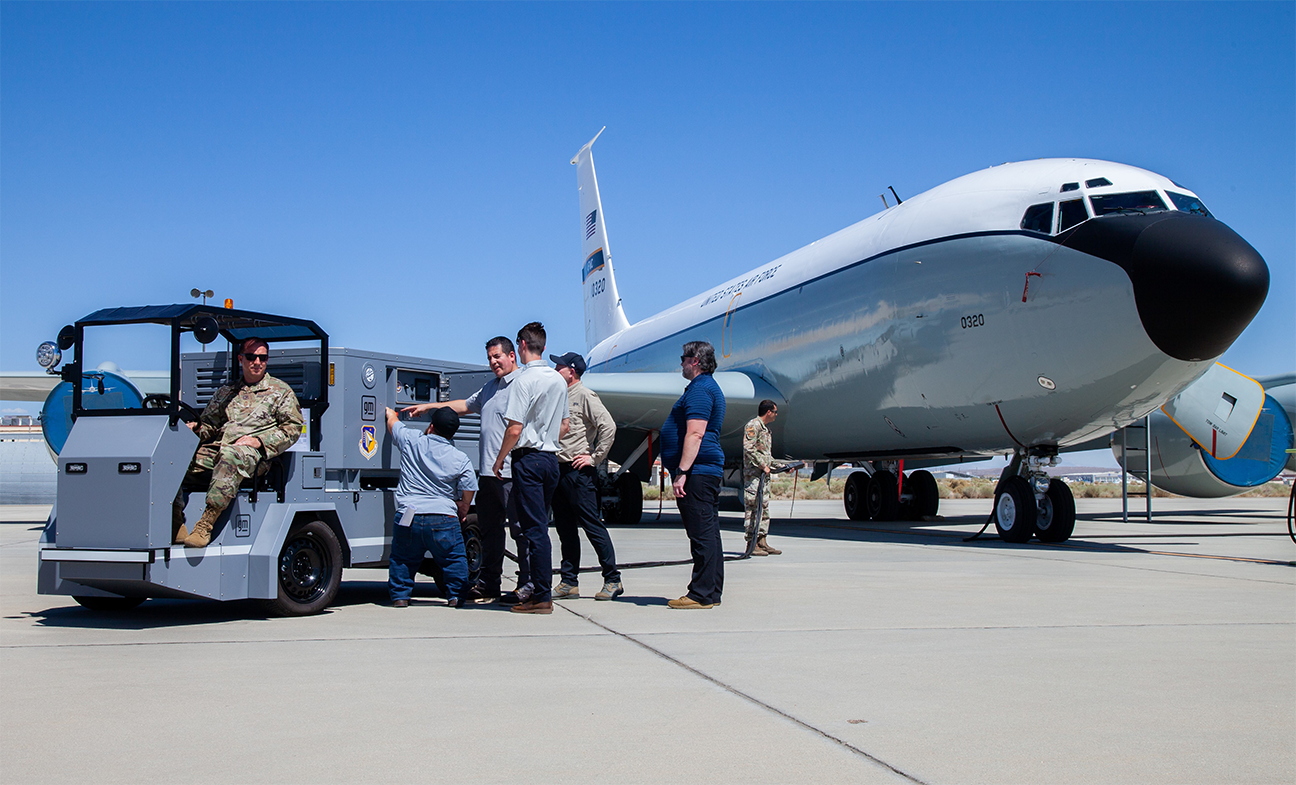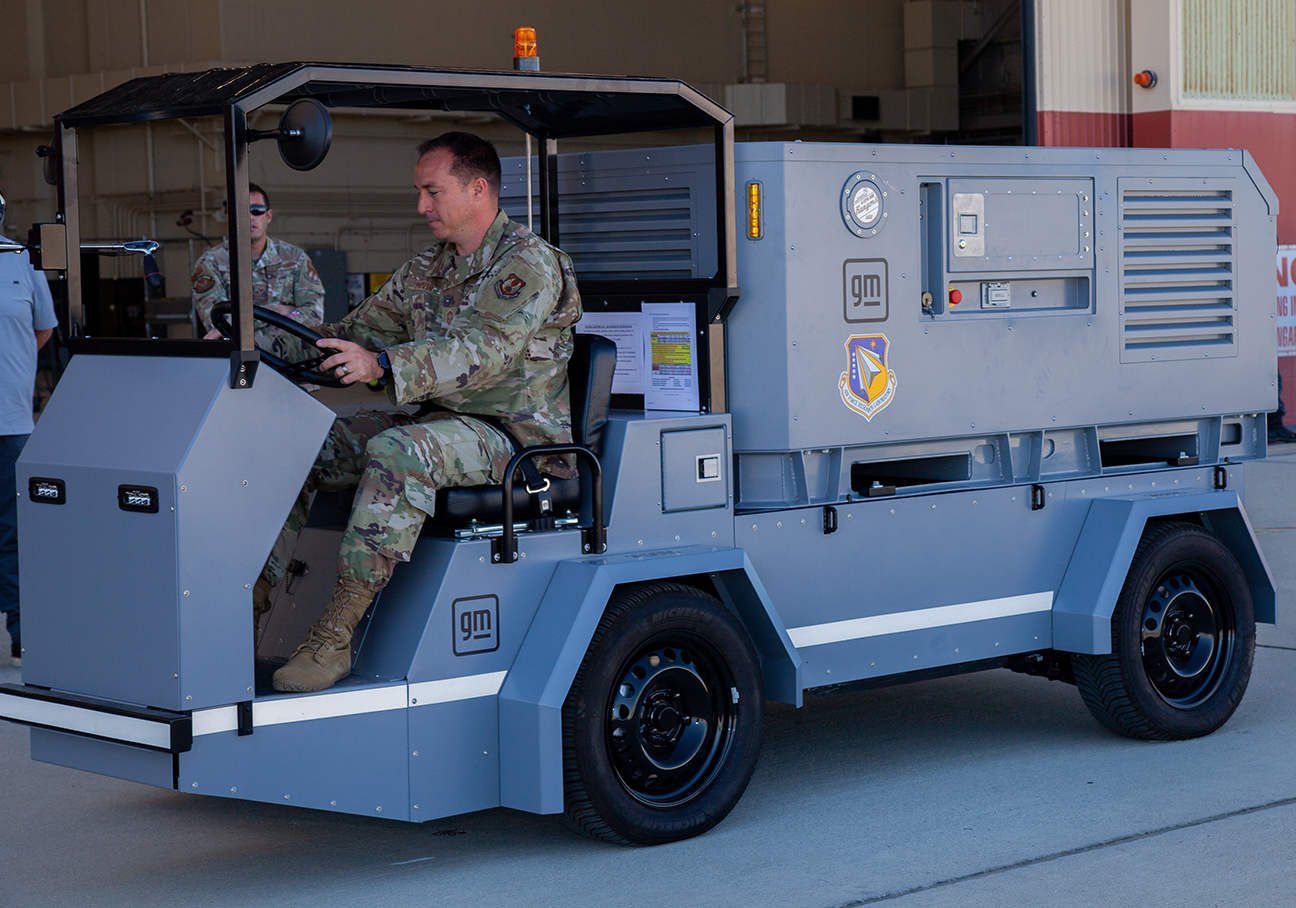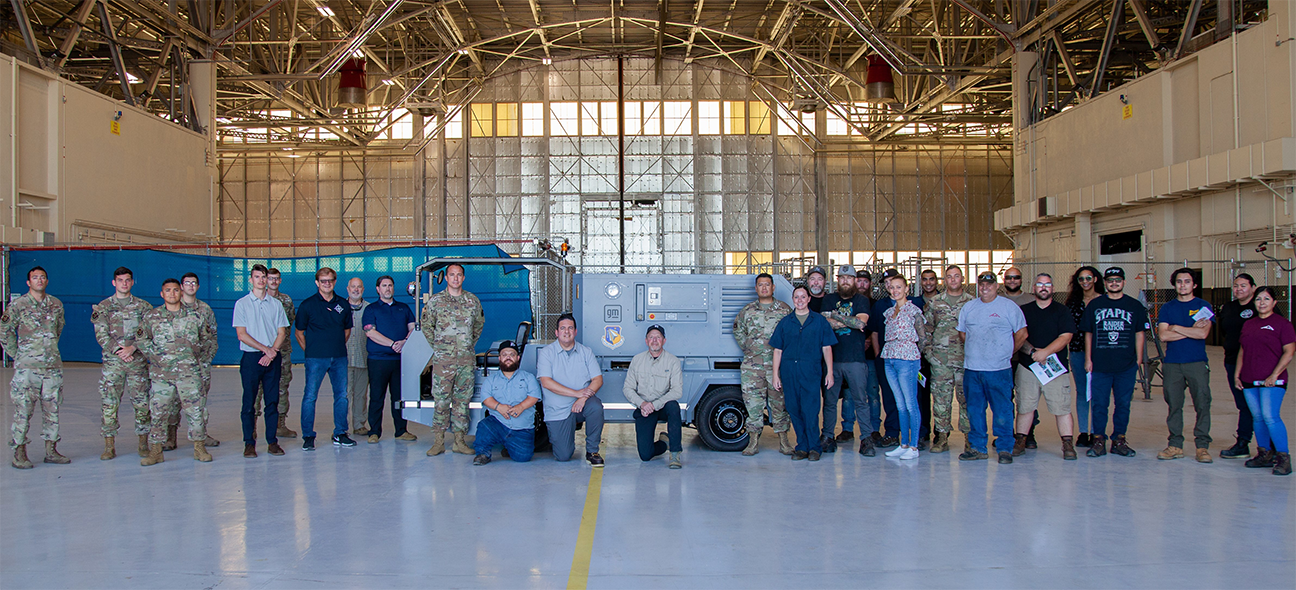WRIGHT-PATTERSON AIR FORCE BASE, OHIO (AFRL) – The Air Force Research Laboratory collaborated with the Air Force Life Cycle Management Center, Air Force Materiel Command headquarters and General Motors Defense to successfully power a KC-135 tanker aircraft with GM Defense’s Electric Ground Power Unit at Edwards Air Force Base, California, Aug. 14-17, 2023.

The Air Force Research Laboratory, collaborated with the Air Force Life Cycle Management Center, Air Force Materiel Command, and General Motors Defense to power a KC-135 tanker aircraft with GM Defense’s Electric Ground Power Unit at Edwards Air Force Base, Calif., Aug. 14-17, 2023. To increase future energy agility, AFRL has teamed with its collaborators to build and test electric and hybrid flightline equipment and vehicles demonstrating many benefits relative to internal combustion engine-based platforms.
The system employs commercial battery electric technology from GM and was transported on an electric cart integrated with GM’s Powered Solutions battery and electric drive system. The Electric Ground Power Unit and cart serve both military and commercial aircraft purposes.
“We are working to leverage the automotive industry in the electrification of our flightline power systems now, but I’d also like to lean forward and leverage domestic automotive industry technology for flightline autonomy as well,” said Tahrea Grant, Air Force Life Cycle Management Center chief engineer.
In the future, Grant added, he hopes to see the same technology solutions applied daily in the domestic automotive industry used on DAF flightlines.
Flightline aviation ground support equipment and vehicles are critical to Department of the Air Force military aircraft operations, both stateside and in deployment settings.

The Air Force Research Laboratory collaborated with the Air Force Life Cycle Management Center, Air Force Materiel Command, and General Motors Defense to power a KC-135 tanker aircraft with GM Defense’s Electric Ground Power Unit at Edwards Air Force Base, California, Aug. 14-17, 2023. To increase future energy agility, AFRL has teamed with its collaborators to build and test electric and hybrid flightline equipment and vehicles demonstrating many benefits relative to internal combustion engine-based platforms. (Courtesy photo / Carla Escamilla, 412th Public Affairs)
“With access to the advanced technologies of our commercial parent, General Motors, GM Defense is transitioning our unique defense and government customers to a more electric future,” said Rick Kewley, GM Defense Product Development and Advanced Engineering vice president. “Our commercial-based Electric Ground Power Unit helps eliminate the emissions of greenhouse gases during operation, while also providing near-silent operations. We’re pleased to be providing a solution that enhances their capabilities.”
To embrace and enable evolving electric flightline equipment and vehicle capabilities, the DAF requires safe, affordable domestic battery sources. Most equipment and vehicles currently in DAF service rely upon continuously running internal combustion, or IC, engines that are fossil fuel-dependent. To increase future energy agility, AFRL has teamed with its collaborators to build and test electric and hybrid flightline equipment and vehicles demonstrating many benefits relative to IC engine-based platforms.
David Juhassz, GM Program Engineering manager, led the development effort for GM Defense and supported this program for the last three years, adapting GM’s advanced commercial technology to meet the needs of flightline aviation.
“The flightline maintainers at Edwards really appreciated the zero noise and zero emissions,” said Juhassz. “We’re thrilled that the demonstration with the Air Force was a success.”

Chief Master Sgt. Darl Parvin Jr. takes the Electric Ground Power Unit and Cart for a test drive at Edwards Air Force Base, Calif., Aug. 14-17, 2023. Flightline aviation ground support equipment and vehicles are critical to the Department of the Air Force military aircraft operations, both stateside and in deployment settings. (U.S. Air Force photo / Carla Escamilla, 412th Test Wing Public Affairs)
Chief Master Sgt. Darl Parvin Jr., AFMC aviation support equipment lead, told the combined testing team at Edwards that increased flightline electrification is in the DAF’s future.
“We need to embrace it, prepare for it and be proactive to figure out where we can accomplish our mission better,” Parvin said. “To win our future conflicts, our combat and mission capabilities must be better than our past.”
Leveraging technology and automotive industry manufacturing muscle for DAF flightline applications is a strategic vision for the Air Force Life Cycle Management Center’s Support Equipment and Vehicles program office and AFRL’s Materials and Manufacturing Directorate.
“Our shared vision and organizational commitment toward flightline modernization is a benchmark and best practice for the USAF,” said Grant.

The Air Force Research Laboratory evaluation team successfully demonstrated a flightline test to power a KC-135 tanker using an Electric Ground Power Unit and Cart Test at Edwards Air Force Base, Calif., Aug. 14-17, 2023. To increase future energy agility, AFRL teamed with collaborators to build and test electric and hybrid flightline equipment and vehicles that demonstrate many benefits relative to internal combustion engine-based platforms. (U.S. Air Force photo / Carla Escamilla, 412th Test Wing Public Affairs)
Tom Layne, AFRL’s Materials and Manufacturing Directorate project lead, noted energy storage, agility and resilience, as well as robust, trusted domestic defense manufacturing and industrial bases are critical to the DAF.
“This project with GM Defense, the program office, the lead major command and the 412th Test Wing allowed us to all work together and successfully touch on all of these factors,” Layne said.
However, Layne added, to enable increased flightline electrification, charging infrastructure and standard charging interfaces are also critical.
“We need to get out in front of the flightline charging infrastructure part to embrace energy agility, resiliency, and maximize equipment and vehicle interoperability when stateside and deployed,” Layne said.
About AFRL
The Air Force Research Laboratory is the primary scientific research and development center for the Department of the Air Force. AFRL plays an integral role in leading the discovery, development, and integration of affordable warfighting technologies for our air, space, and cyberspace force. With a workforce of more than 12,500 across nine technology areas and 40 other operations across the globe, AFRL provides a diverse portfolio of science and technology ranging from fundamental to advanced research and technology development. For more information, visit: www.afresearchlab.com.
